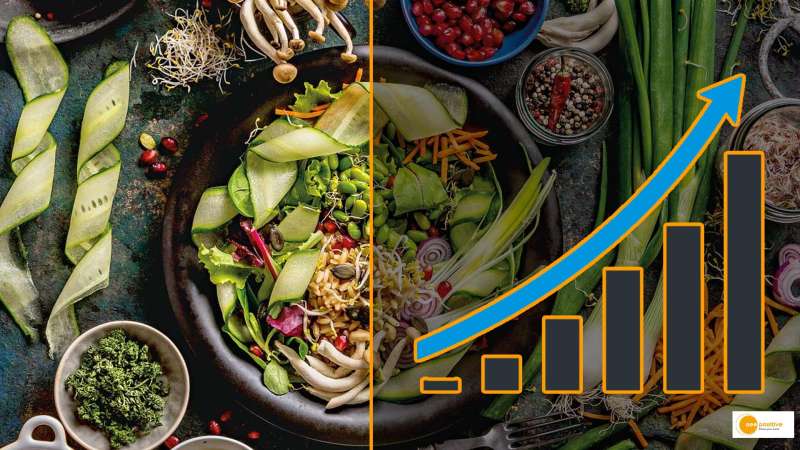

There is a rise in the demand for plant-based foods and sustainable foods. Being health conscious and following the most common suggestions from doctors, people have started to adapt their diets to be plant-based and consume sustainable foods. The new coronavirus has brought attention to social injustice and health problems in our culture. As a result, businesses are beginning to take social and health issues more seriously when developing their sustainability plans.
The growing interest in regenerative agriculture, which refers to farming methods that promote (regenerate) soil fertility and can aid in the reversal of climate change, is another development. Regenerative agriculture is receiving funding from an increasing number of businesses. The difficulty of sustainability has significantly increased as a result of these changes.
What does the research say about sustainable food?
Over the past few years, there has been a significant increase in the demand for plant-based and sustainable foods. This shift in consumer behavior is driven by various factors, including growing concerns about animal welfare, environmental sustainability, and personal health.
Sustainability is not just limited to the food industry. In recent years, there has been a growing awareness of the impact that our purchasing choices have on the environment. Consumers are demanding more environmentally-friendly products and are willing to pay a premium for brands that prioritize sustainability.
The vast majority of consumers today look for goods that can enable them to lead more environmentally and socially responsible lives.
• The current customer loves sustainable food brands and regularly places them in both their digital and physical shopping baskets, supposing taste and price are frequently nearly equal.
• The nexus of people, the world, and the community will be where sustainable foods are found in the future.
• According to Forbes researchers who consulted Barkley consumer research and conducted dozens of CMO interviews.
The main benefit of these sustainability initiatives is the promotion of sustainable development through eco-labels.
Why is there a demand for plant-based foods?
Consequently, an increasing number of agricultural crops are grown in less environmentally damaging ways. Confusion among consumers is the main drawback.
Confusion about what constitutes an ethical or sustainable product is being caused by the proliferation of eco-labels on food products.
Health concerns are also playing a major role in the shift towards plant-based diets. Many people are recognizing the health benefits of a diet rich in whole, plant-based foods, such as fruits, vegetables, legumes, and whole grains. Studies have linked these diets to a reduced risk of chronic diseases such as heart disease, type 2 diabetes, and certain cancers.
In addition to health benefits, the environmental impact of animal agriculture is another key factor in the growing demand for plant-based foods. The production of animal products contributes to greenhouse gas emissions, deforestation, and water pollution, among other environmental problems. By choosing plant-based options, consumers are reducing their carbon footprint and helping to protect the planet.
This shift towards plant-based and sustainable foods presents an opportunity for businesses to meet the growing demand for ethical and environmentally-friendly products. Companies that can innovate and provide consumers with high-quality, plant-based options will have a competitive advantage in the market.
Recent information provided by studies
The feeding, breeding, and dwelling habitats of many species also vanish as more forests and wild lands are removed for agriculture and livestock grazing. According to the analysis, the planet’s capacity to support humans may be in jeopardy unless we modify what and how we consume.
Human action will ultimately determine what happens to the world’s threatened wildlife populations. The growing acceptance of plant-based meat and dairy substitutes encourages the future. While transitioning to plant-based diets would free up grazing space that could be used for other purposes. Growing cattle increases greenhouse gas emissions.
It can be improved by:
• Global adoption of a plant-based diet would improve dietary health
• Contribute to the reduction of food waste, and do away with the need to continually clear additional land for grazing.
• Switching to a plant-based diet would free up 75% of the world’s cropland for non-cropland purposes.
• The research suggests altering food habits in addition to safeguarding and reserving more area for nature rather than turning it into agricultural land.
• Woods and wild terrain function as natural carbon stores to absorb air pollution, helping to lessen the effects of the climate problem.
According to a study, customers today favor brands that are environmentally and socially responsible.
Taking into account these figures:
• 65 percent of customers look for products that can help them live more sustainably and responsibly
• 60 percent of consumers make purchases from businesses for goods and services.
• 43 percent of consumers tend to buy more goods and services from high-purpose brands than from their low-purpose rivals.
• 60% of consumers purchase goods and services from companies that are socially and/or environmentally responsible.
• 54 percent of consumers try to buy goods and services from brands that take a stand on social or environmental issues.
Changing consumer aspirations and a growing appetite among investors to back plant-based ventures are among the drivers of global plant-based market growth. The
growth of demand for plant-based and sustainable foods is because humans are adapting to the changes, which will have less impact on the environment. This is the start of a very great evolution. An evolution whose results would lead to the establishment of perfect biodiversity before its disturbance.
Conclusion
The increasing demand for plant-based and sustainable foods is a reflection of a broader trend toward greater awareness of health and environmental issues. This trend is set to continue, presenting an opportunity for businesses to meet the needs of consumers who are looking for more ethical and environmentally-friendly products.


